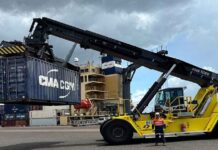In today’s fast-changing logistics landscape, the ability to adapt to market fluctuations, meet sustainability goals, and optimize operational costs is critical for businesses, especially in retail and e-commerce. Managed transportation has become a crucial strategy for businesses looking to streamline supply chains and tackle challenges like labor shortages, regulatory compliance, and sustainability.
A managed transportation strategy involves outsourcing a portion or the entirety of logistics operations to a third-party provider. These providers combine expertise, technology, and infrastructure to deliver efficient, resilient, and scalable solutions. Here are five reasons why adopting managed transportation is a smart move for businesses navigating the complexities of modern logistics.
-
Overcoming the Talent Shortage
The logistics industry faces a significant talent shortage as companies struggle to find skilled professionals capable of managing today’s complex supply chains. Over the past two years, the freight market’s challenges—including inflation, labor cuts, and increased demand—have strained shippers’ ability to maintain adequate staffing levels.
Many businesses, particularly small and midsize enterprises, lack the resources to recruit and retain supply chain experts or invest in advanced logistics technology. A managed transportation strategy bridges this gap by providing access to an established network of skilled professionals and technology-driven systems without the high costs of in-house staffing.
Managed providers can handle tasks such as routing, freight procurement, and compliance, ensuring businesses stay agile and responsive to market shifts. This approach empowers companies to focus on their core competencies while benefiting from expert logistics management.
While overcoming the talent shortage is essential, businesses also need to ensure they can adjust quickly to market shifts, which is where scalability comes into play.
-
Adapting to Market Volatility with Scalability
Supply chain disruptions, seasonal demand spikes, and fluctuating freight costs make scalability a critical factor for businesses. Managed transportation solutions offer the flexibility to scale operations up or down as demand changes, without the need for significant capital investments.
For instance, businesses experiencing a surge in orders during peak seasons can rely on managed transportation providers to adjust freight volumes, optimize carrier selection, and ensure on-time deliveries. Similarly, during periods of reduced demand, businesses can scale down their logistics operations without the burden of maintaining fixed resources.
By leveraging the expertise of managed transportation providers, companies can remain prepared for market volatility while reducing costs and maintaining service excellence. This scalability ensures continuity even during unforeseen disruptions, giving businesses a competitive edge.
-
Building Resilient and Efficient Supply Chains
Resilience has become a cornerstone of supply chain management in a world prone to disruptions caused by natural disasters, geopolitical events, and economic uncertainty. Managed transportation providers play a crucial role in creating resilient supply chains by offering real-time visibility, proactive decision-making, and end-to-end operational support.
These providers use advanced tracking tools to monitor shipments and identify potential disruptions before they escalate. Whether it’s rerouting shipments during a storm, sourcing alternate carriers, or expediting replacement inventory, managed transportation ensures businesses can respond quickly and effectively to challenges.
Moreover, resilient supply chains reduce delays and operational inefficiencies, enabling businesses to maintain customer satisfaction and meet commitments even during crises. By integrating managed solutions, companies can transform potential disruptions into opportunities for innovation and improvement.
-
Driving Sustainability and Eco-Friendly Logistics
Sustainability has become a key focus for businesses as regulators and consumers demand greater responsibility in environmental practices. Managed transportation providers excel in implementing eco-friendly logistics strategies that balance sustainability goals with cost efficiency.
These providers optimize shipping operations by consolidating shipments, reducing empty miles, and selecting transport modes that minimize environmental impact. For example, freight consolidation allows businesses to combine multiple shipments into a single load, reducing fuel consumption and emissions.
Additionally, managed providers guide businesses in adopting sustainable packaging solutions, such as recyclable materials and optimized package sizes. This approach not only aligns with regulations such as the European Packaging Act (VerpackG) but also caters to consumers who prioritize environmentally conscious brands.
Sustainability is no longer optional but a competitive advantage in global markets. Businesses partnering with managed transportation providers can enhance their reputation while reducing their carbon footprint and operational costs.
-
Simplifying Technology Integration and Data Analytics
The logistics industry increasingly relies on technology to improve efficiency, but many businesses struggle to adopt and integrate the necessary systems. Managed transportation providers bring advanced tools and data-driven insights to streamline operations and enhance decision-making.
These providers offer solutions such as:
- Automated route optimization to identify cost-effective delivery paths.
- Real-time tracking systems that provide visibility into shipment status and potential delays.
- Data analytics platforms that predict trends, identify inefficiencies, and support strategic planning.
The actionable insights generated by these technologies enable businesses to respond faster to disruptions, optimize costs, and improve service levels. By partnering with providers that specialize in logistics technology, companies can bridge the gap between operational needs and digital transformation goals.
Managed Transportation: A Path to Success
Adopting a managed transportation strategy allows businesses to overcome some of the most pressing challenges in modern logistics. By addressing labor shortages, providing scalability, building resilience, and supporting sustainability, these solutions empower companies to achieve operational excellence while staying flexible in a dynamic market.
Retailers and e-commerce businesses stand to gain the most from managed transportation as they navigate cross-border logistics, meet growing consumer demands, and adapt to regulatory requirements. Through collaboration with experienced providers, businesses can create supply chains that are not only efficient and cost-effective but also aligned with sustainability goals and customer expectations.
In today’s competitive landscape, managed transportation has become a necessity. Retailers and e-commerce businesses that embrace this strategy can not only streamline their supply chains but also achieve greater flexibility, sustainability, and cost efficiency.























